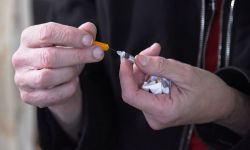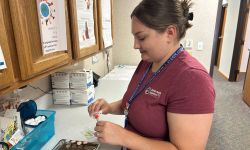Can I get tested for coronavirus in Michigan and other questions answered

It can be difficult to sort through the clamor of changing guidelines and mixed messages about coronavirus, or COVID-19. And let’s be honest: There are a whole lot of people talking without the facts.
Bridge Magazine is partial to facts and experts, so we’ve worked through the social media outrage and conspiracy theories to offer useful tips on how to stay healthy and keep our loved ones and work colleagues healthy, too.
Have any additional questions? Send us an email at help@bridgemi.com and we’ll do our best to answer as many as we can.
I feel sick. What do I do?
Pick up the phone before you hop in your car to go to your doctor. It may be safer not only for others, but for you, too.
It comes down to the social distancing you’ve heard about to protect you from infected droplets when someone sneezes or coughs — spraying infected fluid that can travel up to six feet.
Keeping that distance between patients in waiting rooms and elsewhere in health care settings is such a concern, in fact, that some Michigan providers plan to begin screening patients in parking lots who called ahead with flu-like symptoms in the coming days,said Michigan State University's infection disease expert Dr. Peter Gulick..
So what happens if I’m sick?
Your doctor or their staff may ask you a series of questions over the phone about your symptoms and possible exposure to the coronavirus. If your symptoms are mild and possibly the result of a common cold or seasonal flu, you may be instructed to stay home and monitor your symptoms to make sure they don’t worsen.
Stay home? That’s a difficult thing for a patient to hear, especially in the current anxiety about COVID-19. But that advice is likely safer for other patients and for you to avoid possible exposure to other patients who have been infected, Gulick said.
- The latest: Coronavirus Tracker: What Michigan needs to know, with map of known cases
- How to prepare for coronavirus in Michigan. Step 1: Breathe
- How to make your own hand sanitizer during coronavirus shortage
That’s especially true for elderly patients or those who are more vulnerable because of underlying health conditions, he added. In fact, the U.S. Centers for Disease Control and Prevention recommends all people who feel mildly sick with COVID-19 stay home.
You also might be asked to drive to your doctor’s office to be screened in a separate area such as a parking lot. There, staff might take your temperature or bloodwork. Finally, you may also be told to report to the doctor’s office or even a hospital where you will be treated in special rooms isolated from the rest of the facility, Gulick said.
If I want a test can I get one?
The short answer is that it is not up to an individual. That’s up to a doctor who suspects your symptoms may be coronavirus disease. Under state testing protocol, a doctor who suspects a case of coronavirus must first contact the local health department. The department then contacts the Michigan Department of Health and Human Services, which provides guidance on whether a test is warranted. If approved, the physician then obtains nasal and oral swabs from the patient and the specimens are shipped overnight or via courier to the state lab.
Private labs are also now doing testing in Michigan, but these tests must be approved by a health care provider as well.
For those who think they may have coronavirus disease, experts advise they contact their doctor’s office by phone first instead of going to the doctor for a personal visit. Doctors will advise you on the next appropriate step.
For those without a primary care physician or health insurance, there is a network of free clinics in Michigan to serve this population. There is also a network of Federally Qualified Health Centers that serve individuals regardless of insurance status.
How do I know if my symptoms are flu or coronavirus?
This can be confusing. Both are contagious respiratory diseases with similar symptoms, though they stem from different viruses.
The coronavirus that emerged in December in Wuhan, China, is part of a larger family of coronaviruses that cause the common cold.
Both flu and coronavirus can cause fever, cough, body aches and fatigue and can lead to pneumonia, according to Lisa Maragakis, senior director of infection prevention at Johns Hopkins. (The flu vaccine boosts odds against getting the flu, which you can still receive.) This chart shows the symptoms most commonly associated with the coronavirus outbreak.
Though much is still unknown about the new coronavirus, it’s already proven itself far more dangerous than the flu, particularly for the elderly. And while there is a flu vaccine, there is no vaccine yet for COVID-19, and experts say developing one for the public is at least a year away.
Given the difficulty in distinguishing flu from coronavirus, testing ordered by a doctor is the best way to determine the cause of your infection. Following guidelines by health officials, doctors will most likely try to rule out seasonal flu or other infections before testing you for coronavirus.
Why all the freakout about the new coronavirus?
First, there is no vaccine for coronavirus, which is highly contagious and potentially deadly, especially for the elderly or those who already have a serious underlying condition. Even if you’re young and healthy, you can pass the virus to more vulnerable people. That’s why you’re being nagged to wash your hands often and well. (Listen, it’s important.)
As health and infectious disease officials try to learn more about the new virus and how to treat it, it’s important that everyone take steps to slow its spread so hospitals and testing centers do not become overwhelmed. That’s why Michigan’s K-12 schools, colleges, sports leagues, governments and businesses are cancelling events, getting more people to work from home and beseeching people to follow basic hygiene rules. \
It’s about “flattening the curve”; slowing the spread of the disease so doctors, health centers and testing labs can keep pace with infections. Stretching out cases over a longer period also provides more time to develop medications and, ultimately, a vaccine, according to Dr. Howard Markel of the University of Michigan, who has studied public responses to past epidemics.
What personal hygiene rules should I follow?
The good news is that simple precautions will protect you the most: . \
- Wash hands often with soap and water for at least 20 seconds (about the time it takes to sing Happy Birthday twice) It’s especially critical after using the bathroom, touching surfaces used by others, before eating, and after blowing your nose, coughing or sneezing.
- No soap and water? Use an alcohol-based hand sanitizer with at least 60 percent alcohol.
- Avoid touching your eyes, nose and mouth with unwashed hands.
- Avoid close contact with people who are sick.
- Avoid crowded settings, try and keep at least six feet distance to protect against the spread of droplets from coughs or sneezes.
- If you’re sick, stay home.
- Cover your cough or sneeze with a tissue, then throw the tissue in a covered trash container.
- Clean and disinfect frequently touched objects and surfaces using a regular household cleaning spray or wipe.
- If you think you’ve come in contact with someone with the virus, contact your health provider or local health department immediately.
Related: How to prepare for coronavirus in Michigan. Step 1: Breathe
Store shelves are empty. Can I make my own hand sanitizer?
If you can’t find sanitizer on the shelves and don’t want to overpay on the black market, you might want to consider making your own. The World Health Organization recommends a recipe containing nine parts 99 percent isopropyl alcohol (also known as rubbing alcohol), a bit of hydrogen peroxide and a moisturizing agent, such as glycerol or aloe vera gel. A caution: the WHO’s recipe appears to be written for Nobel laureates rather than mortals.
You can concoct your own recipe from aloe vera and 99 percent rubbing alcohol (or seek inspiration from a host of recipes posted online) so long as the mixture is made of at least 60 percent alcohol. Any less, and it won’t be an effective germ-killer, according to the Centers for Disease Control and Prevention.
But note it’s important to get the concentration right or your sanitizer may not be effective or will be too harsh on your skin, which is why several health organizations urge people to avoid DIY concoctions.
If you insist, John Protaciewicz, chair of Case Western Reserve University’s Chemistry Department, recommends a ratio of rubbing alcohol to aloe vera as 2/3 cup to 1/3 cup, which could work out to about 62 percent alcohol, just above CDC guidelines.
Stir the ingredients to combine them, then pour the mixture into a clean plastic bottle or soap dispenser. When using the mixture, rub it on the surfaces of both hands until your hands are dry.
But also note: Sanitizer is no substitute for hand washing. The best way to keep germs including coronavirus off your hands is to wash for at least 20 seconds with soap and water.
What about my smartphone?
For all of us addicted to smartphones, this is critical to know. Your smartphone is a virtual petri dish for viruses and bacteria. Remember, anything your hands and fingers touch is all over your smartphone.
Prior to the coronavirus outbreak, smartphone makers were recommending using a cloth dampened with water to clean their phones.
Apple now recommends using a wipe with 70 percent isopropyl or a Clorox wipe to clean iPhones. Apple advises that you gently wipe your device by these means and avoid submerging your phone in disinfectant.
How do I stay safe in public?
The best rule of thumb is to keep a respectful distance from others. It’s best not to shake hands (some advise elbow bumps.) Many states are cancelling large gatherings during the outbreak, something health experts also recommend. They can expose you to more people who might have the virus and can be a vehicle for spreading the disease. For those who use public transportation, it’s also wise to be wary of touching poles on a bus or even seat edges. The same goes for surfaces in any public place. If you have no choice remember not to touch your face afterward, and give yourself a thorough hand washing or disinfectant wipe afterward.
If I have to fly, what precautions should I take?
The CDC says most viruses and other germs do not spread easily on airplanes because of how air circulates and is filtered on aircraft. Even so, it advises travelers to avoid contact with sick passengers and wash their hands often with soap and water for at least 20 seconds or use hand sanitizer that contains 60-95 percent alcohol. Many fliers are wiping down airline seats and tray tables with wipes, and that can’t hurt.
Will I die if I am exposed to coronavirus?
Short answer: Most likely not, but the rising tide of cases and deaths around the world, particularly among people over 60 or those with other medical vulnerabilities, underscore the need to take safety precautions seriously. Don’t be this guy!
In trying to understand just how dangerous coronavirus is, experts are trying to nail down two numbers.
The first represents how fast the virus spreads. It’s currently believed that each person who is infected will transmit it to another 2.2 people. That number — 2.2. — is called the R0, pronounced “R-naught.” In comparison, a patient with measles is believed to infect 12 to 18 other people.
The second number is how deadly it is for those who are affected.
Older people and those with underlying health conditions are most at risk, but there are others who are sickened and will recover, and those who are infected but never develop serious symptoms. At this point, it is believed about 2 percent of those who are sickened die, although estimates have placed it up 3 or 4 percent of the overall coronavirus population. The numbers may vary between countries and communities, depending on access to and quality of the health care. (By comparison, under 0.1 percent of people who contract the seasonal flu will die.)
Finally, part of the difficulty in nailing the numbers more specifically is that the denominator isn’t known because some people who are infected may have mild to no symptoms or for other reasons don’t seek medical care.
Can I give coronavirus to my pet?
It’s true that coronaviruses in general may jump from animals to humans (Another coronavirus, severe acute respiratory syndrome, or SARS, was linked to bats and civets; still another, Middle East respiratory syndrome, or MERS, was linked to bats and camels.)
That said, there have been no confirmed cases of COVID-19 among pets in the U.S., and no reason to believe household pets can be a source of infection, according to the CDC. But until more is known about the virus, the CDC recommends limiting interactions with pets if you are sick with COVID-19 AND wash your hands after being around animals because they can spread other diseases.
Who's most at risk?
Older adults are most at-risk — that became clear early on, as COVID-19 swept through Wuhan, China. While the overall death rate has wavered between 1 to 4 percent, it stood at 8 percent for those in their 70s and 14.8 percent among those 80 and older.
People who have serious chronic underlying medical conditions such as heart disease, diabetes and lung disease also are at greater risk as well as those with compromised immune systems.
The CDC urges those at greatest risk to pay special attention to personal hygiene, stay home if possible if coronavirus is detected in their communities, and consult with their doctor to stock up on medical supplies.
Do I need to wear a mask? Where can I get one?
Public health experts — local, national and international — have repeatedly stated that regular surgical masks do not protect you against COVID-19. Specialized N-95 masks aren’t a guarantee either, especially among non-health care workers who aren’t specially fitted for them.
Masks can be found at local stores and on-line, but public health experts have implored people who are not sick to not wear masks.
Related: The first line of defense against coronavirus: Try soap, not a mask
COVID-19 is spread in respiratory droplets from coughing and sneezing between people who are in close contact with one another, or within about six feet, according to the CDC.
For that reason, masks should be worn by those who are sick and health care workers. The masks help the sick from spreading the infection through sneezing and coughing, and they provide a layer of protection for health care workers who may come in direct contact with those droplets as they care for the sick who may sneeze and cough, sending droplets into a caregiver’s face.
At what point should I call in sick to work?
If you feel ill and suspect you may have the coronavirus, experts recommend you stay home and avoid public areas. Experts say “social distancing” is the best way to combat the spread of the virus since a vaccine does not yet exist.
Even if your illness is not the new coronavirus, staying home protects your co-workers from what does ail you. While in isolation, the CDC recommends staying away from others, avoiding public transportation, and wearing a facemask around others.
What does self-isolation mean?
Hundreds of Michiganders have been flagged by the CDC for self-isolation and monitoring by local health departments. They generally did not have symptoms but had traveled to an area highly affected by coronavirus or had possible contact with someone with such symptoms.
There are several levels of self-isolation and monitoring, but generally it means that individuals are asked not to leave the house and minimize all contact with other people for 14 days — what is believed to be the longest time it takes for a person to become infected and show symptoms.
If a person is being actively monitored, an individual is asked to check their temperature twice a day and watch for any emerging symptoms. Local health departments are to have contact at least once a day to record any temperature changes or possible health changes. How that contact takes place - when and how - is worked out between the person and health department.
What is a pandemic?
The World Health Organization has declared the new coronavirus a pandemic. A pandemic is a global outbreak of a serious new illness that requires “sustained transmission throughout the world," Anthony Fauci, director of the National Institute of Allergy and Infectious Diseases, said in February. Many associate the word with the 1918 flu pandemic that killed tens of millions of people around the world, but the term doesn’t require that level of death.
What should I tell my child?
In light of the coronavirus disease outbreak in Michigan, Gov. Gretchen Whitmer is closing all public and private K-12 schools until April 6. In the meantime, it is best to be honest with your child about what this new virus is without being frightening. You can also truthfully reassure your child that very, very few children seem to get seriously sick from this virus. Your child may well hear rumors about this disease from peers. Take their questions and fears seriously so they are more likely to share them with you and get the facts. A basic factual understanding of the disease and what is happening is a good foundation to avoiding panic.
How can I protect employees at work?
Co-workers should refrain from handshakes or other forms of direct contact. Frequently touched objects like door handles, desks and handrails should be cleaned often. You can schedule email reminders to have employees regularly wash hands.
As much as possible, choose video or phone conferencing or, if not possible, hold meetings in open, well ventilated areas. Business travel, if possible, should be assessed for risk and necessity. Many companies are cancelling nearly all business travel and encouraging employees to work remotely if possible.
I’m sick or taking care of someone who’s sick. How to keep everyone safe?
The CDC offers a list of instructions and guidelines for caregivers for those who are sick, whether they have a confirmed case of coronavirus or are being tested.
Among the guidelines:
- Keep household members separated from the patient as much as possible, using a separate bedroom and bathroom if possible.
- Unnecessary visitors should be prohibited.
- Ensure that shared spaces have good airflow.
- Wash hand frequently with soap and water (20 seconds) or use an alcohol-based hand sanitizer that contains 60-95 percent alcohol. Make sure to wash all of your hands and rub sanitizer until your hands feel dry.
- If possible, the patient should wear a facemask. If the patient is unable to wear a facemask, the caregiver should wear a mask when in the same room as the patient.
- Do not reuse disposable face masks and gloves.
- Do not share household items with the patient. You should not share dishes, drinking glasses, cups, eating utensils, towels, bedding, or other items.
- Clean all “high-touch” surfaces, such as counters, tabletops, doorknobs, bathroom fixtures, toilets, phones, keyboards, tablets, and bedside tables, every day, using a household cleaning spray or wipe.
And make sure you should monitor your own health and call a doctor if you symptoms — fever, cough, shortness of breath — that could indicate you’ve been infected too. Under certain circumstances — shortness of breath, persistent pain or pressure in your chest, confusion, or bluish lips or face — seek emergency medical attention.
Do I need to deep clean my house?
The CDC urges consumers to clean their homes and clean often, wiping down frequently touched surfaces and objects with regular household detergent and water. That’s especially true during “community spread” of COVID-19.
Disposable, disinfecting wipes work as well. The American Chemistry Council has produced a list of cleaning products, including those commonly found in local stores, that are effective against coronavirus.
You can also use a diluted household bleach solution or alcohol solutions with at least 60 percent alcohol. Unexpired bleach will be effective against coronaviruses when properly diluted. Mix 5 tablespoons, or about ⅓ cup of bleach, in a gallon of water, or 4 teaspoons of bleach in a quart of water. More detailed instructions can be found here.
Do I keep going to the gym? What about restaurants?
Use your best judgment, University of Michigan’s infectious disease physician Dr. Sandro Cinti, recommended Friday during a Facebook Live briefing for the public.
For example, keeping distance from fellow diners may be possible, but “eating out is different than clubbing.”
It’s about “being careful, being aware of the surroundings, (and) cleaning the surfaces,” he said. Those who are elderly or have compromised immune systems have to be more vigilant about avoiding crowds.
Wherever you go, assume that surfaces are contaminated, wipe off surfaces, keep your distance from others, and don’t shake hands, he said. And of course, he added, don’t go out if you’re sick.
What places should I avoid during this outbreak?
Health experts have reached consensus on this: It’s best to avoid large crowds, whether in public or private events. That’s both because you have a greater chance of contracting the virus in crowded spaces, but because if you carry the virus you could pass it on to many others. That’s why a great variety of college and professional sports have cancelled or suspended their seasons and why, for now, presidential candidates are cancelling political rallies. Gov. Whitmer has ordered the cancellation of all events of more than 250 people until April. There are exceptions for manufacturing sites, mass transit and stores.
Whether you should continue to go to church or club meetings or gather with friends at a restaurant is a more subjective call. In any gathering of people, experts continue to advise that you keep a distance of several feet from others and always be conscious of surfaces you touch. As always, wash your hands after you have been out in public.
Where can I find more information?
For Michigan-specific information, visit the state’s coronavirus webpage: www.michigan.gov/coronavirus. For recommendations and updates by the U.S. Centers for Disease Control and Prevention: https://www.cdc.gov/coronavirus. For international updates, visit the World Health Organization: http://www.who.int/coronavirus
See what new members are saying about why they donated to Bridge Michigan:
- “In order for this information to be accurate and unbiased it must be underwritten by its readers, not by special interests.” - Larry S.
- “Not many other media sources report on the topics Bridge does.” - Susan B.
- “Your journalism is outstanding and rare these days.” - Mark S.
If you want to ensure the future of nonpartisan, nonprofit Michigan journalism, please become a member today. You, too, will be asked why you donated and maybe we'll feature your quote next time!








